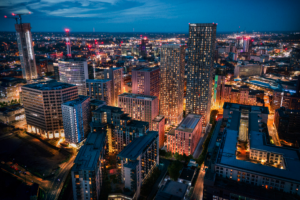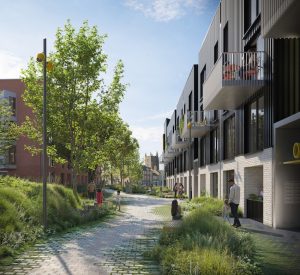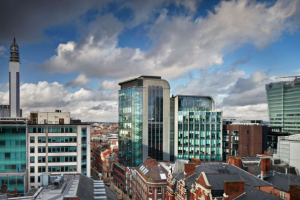Sky’s the limit for Birmingham’s high-rise revolution

Plans for Birmingham’s tallest residential tower are set for approval.
Regal (West Point) wants to build the 31-storey block on the site bounded by Sheepcote Street, Broad Street and Oozells Way in the city centre.
The tower would comprise 205 apartments including a ground floor restaurant, internal and external residential amenity space, associated hard and soft landscaping, infrastructure and engineering works.
The scheme differs from the one put forward in November 2015, for which planning consent was granted. This was for a 22-storey residential building with ground floor restaurant and retail and a 18-storey hotel with ancillary retail and leisure uses. The development also included the part-demolition and refurbishment of the Grade II listed 78 – 79 Broad Street, together with associated hard and soft landscaping.
Work has started on the residential tower (Tower 1) but the applicant no longer wishes to proceed with the hotel option and wants to make the second tower all residential.
The 205 apartments would consist of 86 one-bed, 118 two-bed and one three-bed apartments, with broadly seven apartments per floor, together with a ground floor restaurant.
The proposed ground floor commercial use would open out onto Oozells Way and Broad Street to maximise active frontages and natural surveillance. Access into the lobby for the upper floor residential apartments would be from Sheepcote Street, creating an ‘address entrance’ to the building.
The application site is currently being used as a building compound in connection with the construction of Tower 1.
Seven letters objecting to the scheme have been received and will be considered at today’s Birmingham planning committee.
One said the city had no skyscraper heritage and there was no need for one now. It said Birmingham should learn from the mistakes of other UK cities, which are now demolishing 60s and 70s blocks.
The 31-storey building is also criticised for being out of proportion with the area and would dwarf existing buildings, detracting from the local street scene and de-humanising the area.
“Its size would mean it dominates but is of poor architectural merit, devaluing the quality of this important central area, and damaging the image of the city,” they said.
Another concern is the noise which comes from the clubs and bars along Broad Street, especially on a Friday and Saturday night.
The report to the meeting said the applicant’s acoustic consultants had undertaken a noise survey, which had identified an increase in noise levels on Friday and Saturday nights from 11pm through to 4am.
The consultants have suggested that based on the levels measured, special acoustic glazing should be installed reducing noise levels to an acceptable standard internally. This may include glazing that needs to be kept shut, with alternative means of ventilation being provided.
The report states: “The BDP (Birmingham Development Plan) encourages residential development in the city centre where it provides well-designed high quality living environments. Broad Street is changing and the proposed development of this significant new building would help its further regeneration, providing much needed housing units and a large investment on this site.
“It signals a confidence in Broad Street, as a location for a wider mix of uses, an aspiration that the city is supportive of.”









